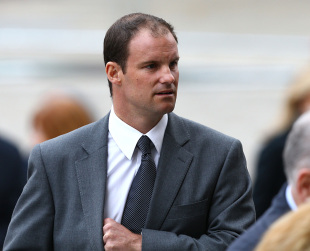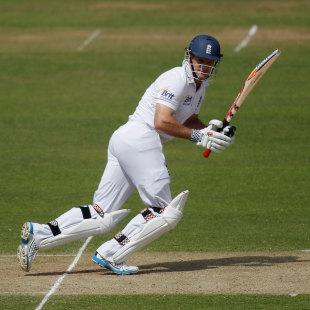Skilful leader, born juggler
Scyld Berry

|
|||
|
Related Links
Players/Officials:
Andrew Strauss
| Leonard Hutton
Teams:
England
|
|||
No modern captain has had such a beneficial effect on the England team as Andrew Strauss. Nasser Hussain changed losers into draw-ers, then Michael Vaughan changed draw-ers into winners. But when Strauss took over as the official captain in January 2009, he not only turned losers into winners in a few short months, but changed the collective culture, for good - in both senses of the word. A group of individuals who had often put self-interest first were transformed by his vision into a team dedicated to England and excellence.
Retaining the Ashes in 2010-11 by winning 3-1 (all three by an innings) was Strauss's proudest achievement. Regaining them in 2009, after inheriting a crisis, was his cleverest. By then, the legacies of Vaughan and his coach Duncan Fletcher had evaporated. He had a resentful predecessor in Kevin Pietersen, no permanent coach, and the uncomfortable knowledge that he had been chosen as a last resort, in the absence of any succession planning. Why Strauss should have been regarded as a last resort is puzzling, given how well he had led the side when filling in for Vaughan in 2006. Perhaps it was a result of his self-effacement, his refusal to blow his own trumpet, and of modern society's inability to recognise true worth.
In any event, when Strauss's team left for the West Indies for his first series as full-time leader, it was the only case in modern times of a captain - not a manager or coach - being in overall charge of an England tour. In an emergency, Strauss was to decide. This was a measure of the chaos in English cricket after the sudden and simultaneous departures of Pietersen and the coach Peter Moores.
Strauss, however, is a skilful juggler: he can keep three cricket balls on the go. He was lucky, too, in having Andy Flower, of like mind, elevated from batting coach to team director after a caretaker role in the Caribbean. Even so, it was a magnificent achievement to regain the Ashes in 2009. Australia scored eight centuries to England's two; Australia had three bowlers who took 20 wickets or more, England none; Australia averaged 40 runs per wicket, England 34. These stats add up to the biggest steal in Ashes history. And by The Oval, it was a patchwork that Strauss led into the field: Andrew Flintoff was on his last legs, Alastair Cook and Paul Collingwood had played only one innings of note apiece, and Pietersen was not even there, absent injured since the Second Test at Lord's.
Yet Strauss took England over the line, leading from the front, changing the culture. For example, he instituted the practice after a day's play of toasting a team-mate who had scored a hundred or taken five wickets, following a brief speech by someone who volunteered. He understood the importance of celebrating as a side.  He had read up on Churchill before taking over, and learned from Vaughan how to put his players at ease so they performed their best. Still, Strauss was a born leader. He did not have to raise his voice: everyone listened because he was so clear in thought and word. Graeme Swann, who stood at second slip alongside him, said: "It was a calming, almost fatherly feeling to know that, in the middle of a maelstrom, he would make the right decision."
Strauss was manifestly not in it for his own glory: it was typical that the England record he set was for the most catches (121) by a non-wicketkeeper, which benefited the team far more than his reputation. He was in it to instil his values and beliefs about what was best for England - but only after listening, not dictating. He had a sense of humour, at least until the job weighed him down in 2012, and therefore of perspective. He never forgot what a privilege it was to represent what became his country from the age of six, or the sacrifices his family made. His manners were always exemplary: he was never confrontational, never thought himself above the law, never looked down on anyone. He would talk with, and ask a polite question of, even the most anorakish England fan. And he became statesmanlike in his pronouncements about wider issues, such as match-fixing, or those beyond sport.
Cricket was not an end in itself. He did not love batting like, say, his former partner Marcus Trescothick, which is why he retired from all cricket as soon as he had finished with England. For him, cricket was the means for undertaking challenges and stretching himself. It could have been another sport. When his prep-school headmaster sent a letter to the warden of Radley College, Dennis Silk, about the 11-year-old preparing to enrol there, he wrote four pages on the promising rugby of this young fly-half. Only as a postscript did he add: "He also has the makings of a useful cricketer."
It was this love of a challenge which enabled Strauss to compose two or three of the most valuable innings ever played for England. His 129 in the deciding Oval Test of 2005 kept them in the game, when no other specialist batsman made 50 in their first innings: typical, again, that everyone forgets Strauss and recalls Pietersen's 158 in their second. His 161 at Lord's in 2009 gave England the psychological lead; and they were soothed by his brace of 55 and 75 at The Oval in the last Test. So long as Strauss was in, England were winning on all these momentous occasions. One false move and they would assuredly have lost the match and series; yet Strauss walked the tightrope while millions watched, without looking down.
Once Strauss got the team culture right, everything flowed from there - like hanging wallpaper properly from the picture rail. His record as England's Test captain by the start of 2012 was 21-5. He had led England to No. 1 in the rankings by supplanting India 4-0. Sir Leonard Hutton and Michael Brearley, if you count the 1978-79 tour of Australia during World Series Cricket, had been the only other England captains to win Ashes series home and away (Percy Chapman won the Oval Test of 1926 after Arthur Carr had drawn the first four, then won again in Australia). But they played when England were the only country with a professional domestic circuit. Strauss made them No. 1 on a level playing field.

|
|||
Self-doubt set in last year. Trying to retain their status - an arithmetical calculation - may have distracted England from winning the next Test. His playing of spin improved after the 3-0 defeat by Pakistan in the UAE - and he was already the only England batsman to score two centuries in a Test in Asia - but the mental side was more important to him than technical competence. He felt he was past his prime; and he had shown by resigning the one-day captaincy after the 2011 World Cup that he would never linger once he had concluded he had given his best.
He was still enthused by the problem-solving side of captaincy, at which he was masterful. But he felt worn down by attending not only to every player, but to all the members of the management team, and had too little energy left for his own game. And that was before Pietersen rocked the boat with his "provocative" texts to the South African tourists, so that instead of concentrating on squaring the series at Lord's and celebrating his 100th Test, it was back to fire-fighting. Of all England captains, Strauss did not deserve his end to be like his beginning.
Only Hutton, from my reading of England's history, has had such a beneficial effect. He took over in a similar state of chaos in 1952, as both the last resort and the first professional captain since the 19th century. England had been thumped by Australia since the Second World War, and had thumped no one in return, yet he transformed them into the team of the 1950s. Both Hutton and Strauss conserved runs in the field, identified players of inner strength, and built a team in their own image.
Both were criticised for being too cautious. Let Strauss speak for both in response: "Based on my own experience, if you starve batsmen of runs they will get edgy, and are likely to get themselves out. That was my philosophy, but if a bowler came up and said, 'I want an extra catcher,' I would say, 'Perfect, let's go along with it.' Normally, though, the bowler hated going for runs. Jimmy Anderson, for example, felt his best way was to starve batsmen, and the way to get the best out of a player is to let him do what he wants. You don't tell Jonathan Trott to score more quickly, because he averages 50 and knows what he's doing.
"It's very easy for commentators and the public to say, when the ball flies through fifth slip: 'You should have had a fielder there.' But that is a bit facile. It is your strategy that wins you games and series, and the most important part of captaincy is to create an environment in which you make best use of the players you have."
Hutton and Strauss: archetypal northern pro and southern amateur type. Poles apart on the surface but, from what I saw when ghosting them, very similar: both outwardly calm, quiet and shrewd problem-solvers who knew their own mind and the direction in which England's cricket should head. I like to think of it as an endorsement, or seal of approval, that Hutton's grandson Ben was Strauss's best man.
When Hutton looked back on his captaincy, after half the Establishment had hoped he would fail so that an amateur could be reinstated, he used to say, with the pauses that were characteristic of his speech: "I never... I never wanted... I never wanted to make... a smell." And, miraculously in this age of intense media scrutiny, Strauss did not do so either: there was no howler, no on-field incident that went undefused, no gesture to any umpire or opponent, not a single word out of place in a press conference or captured on a stump mike. He was dutiful, and selfless in his service to his players and country, until the last.
Scyld Berry, editor of Wisden 2008-11, is the cricket correspondent of the Sunday Telegraph, where he ghosted Andrew Strauss's column

